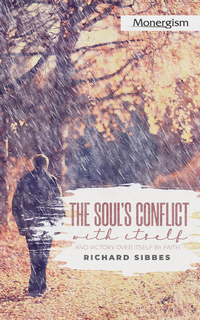 The Soul’s Conflict and Victory Over Itself by Faith
The Soul’s Conflict and Victory Over Itself by Faith
DETAILS: Publisher: Monergism Books Publication Date: July 1, 2022 Format: Paperback Length: 230 pg. Read Date: September 4-18, 2022

What’s The Soul’s Conflict… About?
This is a treatise on:
Why art thou cast down, O my soul? and why art thou disquieted
within me? hope thou in God; for I shall yet praise him, who is
the health of my countenance, and my God.—PSALM 42:11.
Sibbes has two types of believers in mind for this—those who are at peace with the world, who enjoy comfort, and those who are constantly troubled. He seeks to disquiet the former and help the latter to find peace.
He spends a chapter giving an overview of the psalm before diving into the discussion. Following it, the book is pretty cleanly divided into two parts—The Soul’s Conflict and The Soul’s Victory Over Itself. It was pretty easy, despite the lack of a Table of Contents saying “Part II,” to tell when Sibbes switched to the Victory side.
Both of these sections are typical of the Puritan era—squeezing every last drop of water out of the rock that was the topic. There is some exegesis, and a little interpretation of the passage, but it can feel like Sibbes was given an assignment for a listicle—here are 12 reasons your soul can be cast down.
So, what did I think about The Soul’s Conflict…?
Faith is an understanding grace; it knows whom it trusts, and for what, and upon what grounds it trusts. Reason of itself cannot find what we should believe, yet when God hath discovered the same, faith tells us there is great reason to believe it. Faith useth reason, though not as a ground, yet as a sanctified instrument to find out God’s grounds, that it may rely upon them. He believes best, that knows best why he should believe. Confidence, and love, and other affections of the soul, though they have no reason grafted in them, yet thus far they are reasonable, as that they are in a wise man raised up, guided, and laid down with reason; or else men were neither to be blamed nor praised for ordering their affections aright; whereas not only civil virtue, but grace itself is especially conversant in ruling the affections by sanctified reason.
I got to the point, I admit, that I had a hard time getting through the first part of the book, and wondered how long it was going to go on. I know that Sibbes actually could’ve—should’ve—gone on longer to be truly exhaustive about the ways we deceive ourselves, find ways to rebel, and so on. I acknowledge I might be one of the ones he targeted as “too comfortable,” who really needed to study and meditate on those parts before going on to the encouraging section.
Or maybe I’m a victim of 21st Century abbreviated attention-span. Or both. But it did go on so long that it felt like he was just stretching things to make word count (I know that’s not true—he didn’t have one). I had a similar reaction in the last couple of chapters of the Victory section, but it took a little longer for that to happen.
I know I’m coming across as negative here, I don’t mean to be. I liked this, just not as much as I expected to. I go into a Sibbes book expecting a 5 Star experience. If I don’t get it, I probably complain too much. Both sides were insightful and helpful—I think I profited more from the last section, a lot of it was great, and some of the better material I’ve read from Sibbes. I certainly think I’d have a different reaction at another time—and I am going to return to this in a couple of years. Both to understand it better and to see how I react.
In the meantime, for a great example of Puritan spirituality, of a spiritual doctor diagnosing and treating his patients (read: readers), you can’t do better than Sibbes (even if he gets tedious). It’s truly rewarding.

![]()



Read Irresponsibly, but please Comment Responsibly